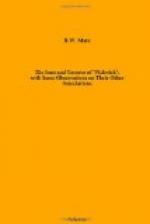CHAPTER II
THE “GOLDEN CROSS,” CHARING CROSS
Before the “Golden Cross” was given such prominence in The Pickwick Papers, it formed the subject of one of the chapters in Dickens’s previous book, Sketches by Boz. But although there is a “Golden Cross” still standing at Charing Cross to-day, and a fairly old inn to boot, it is not the actual one which figures in these two books and in David Copperfield.
As a matter of fact, there have been several “Golden Crosses” at Charing Cross; one, perhaps the first, stood in the village of Charing in 1643. But the one which claims our attention stood on the exact spot where now towers the Nelson Monument in Trafalgar Square, and was the busiest coaching inn in the west end of London. In front of it was the King Charles statue and the ancient cross of Charing. Close at hand was Northumberland House with its famous lion overlooking the scene.
This “Golden Cross” was either rebuilt in 1811 or in that year had its front altered to the Gothic style. Whichever is the case, it was this Gothic inn that Dickens knew and described in his books. It was demolished in 1827, or thereabouts, to make room for the improvements in the neighbourhood which developed, into the Trafalgar Square we all know to-day. It was then that the present building, facing Charing Cross Station, was erected, which, also in its turn, has had a new frontage.
Dickens in his early youth, whilst employed in a blacking warehouse at Hungerford Stairs and during his youthful wanderings, became intimately acquainted with the district. When, therefore, in the early ’thirties he commenced his literary career, he recalled those early days and placed on permanent record his impressions of what he then saw, amongst which was the Golden Cross Hotel.
And so we find that in writing the chapter in Sketches by Boz on “Early Coaches” he chooses the “Golden Cross” of his boyhood for its chief incident, an incident which no doubt happened to himself in his early manhood. He had risen early on a certain cold morning to catch the early coach to Birmingham—perhaps to fulfil one of his reporting engagements:
“It strikes 5:15,” he says, “as you trudge down Waterloo Place on your way to the ‘Golden Cross,’ and you discover for the first time that you were called an hour too early. You have no time to go back, and there is no place open to go into, and you have therefore no recourse but to go forward. You arrive at the office. . . . You wander into the booking office. . . . There stands the identical book-keeper in the same position, as if he had not moved since you saw him yesterday. He informs you that the coach is up the yard, and will be brought round in about 15 minutes. . . . You retire to the tap-room. . . . for the purpose of procuring some hot brandy and water, which you do—when the kettle boils, an event which occurs exactly two and a half




